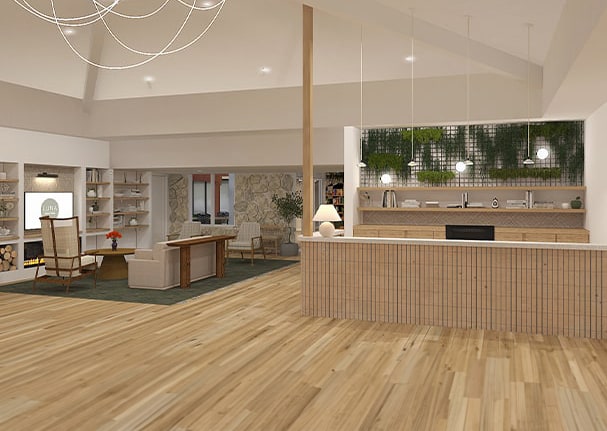Caring for a loved one who is navigating the complex challenges of a memory-related condition can be an emotional and often overwhelming experience. In this crucial juncture of life, understanding what memory care is, how memory care is different from dementia care, and when to consider memory care can bring a sense of security amidst uncertainty.
Some of the key signs that it’s time to consider a move to memory include:
- Changes in behavior
- Safety concerns
- Advanced personal care needs
- Social engagement concerns
- Caregiver burnout
- Medical challenges
- Quality of life concerns
- Financial considerations
- Recommendations from healthcare professionals
Why Do People Need Memory Care?
Memory care is a specialized type of senior care tailored exclusively for individuals experiencing memory loss due to conditions like Alzheimer’s and dementia.
The trajectory of memory impairment is often progressive, presenting a growing need for dedicated care. Memory care is not just about helping people who may be forgetful—it can be essential for supporting people’s safety, well-being, and overall quality of life.
In a supporting environment designed to help minimize stress with activities created to enhance cognitive function, memory care offers vigilant support and structured assistance with daily living—it can be a haven where compassion meets expertise.
How Does Memory Care Benefit Seniors?
Imagine a setting where 24/7 supervision is a given, where personal care doesn’t waver, and stimulating activities are the norm. Memory care can be a bridge to a better quality of life, where the insight of skilled professionals is paired with a heartfelt understanding of your loved one’s needs to offer full support for living well.
Key Factors to Consider & Questions to Ask
Has there been a pivot in your loved one’s behavior? Perhaps an escalation in wandering or a noticeable neglect of personal hygiene? When new risks and challenges appear that require extra support, it may be time for memory care.
When considering whether it’s time for a loved one to transition to Memory Care, asking the right questions can help you and your loved one make an informed decision. Consider the following factors and the questions related to them that may be relevant to your own life.
Changes in Behavior
- Have there been noticeable changes in your loved one’s behavior, such as increased confusion, wandering, or agitation?
- Are there instances where your loved one experiences behavioral challenges that could pose a risk to themselves or other people?
- Is your loved one forgetting the names of close family members or struggling to recognize familiar faces?
Safety Concerns
- Are there safety concerns at home because of issues like forgetting to turn off appliances, leaving the stove on, or wandering outside unattended?
- Has there been a history of falls or accidents alongside memory-related issues?
Advanced Personal Care Needs
- Is your loved one experiencing difficulty with personal care tasks, such as bathing, dressing, or grooming?
- Is your loved one able to manage their medication independently and safely?
Social Engagement Concerns

- Is your loved one showing signs of social withdrawal or isolation?
- Does your loved one wish they had more opportunities to meet people and enjoy social activities?
Caregiver Burnout
- Are you or other caregivers feeling overwhelmed or exhausted from providing constant supervision and care?
- Is the stress of caregiving impacting your well-being or the well-being of your loved one and other family members?
Medical Challenges
- Is there a need for regular medical monitoring or assistance with managing chronic health conditions?
- Are there concerns about proper nutrition and hydration being addressed adequately?
Quality of Life Concerns
- Does your loved one require specialized memory care services tailored to their cognitive needs?
- Will the structured environment and activities offered in memory care enhance your loved one’s quality of life?
- How will the move impact your loved one’s overall quality of life and emotional well-being?
Financial Considerations
- Have you considered the financial implications of moving to memory care, including costs and available coverage?
- Is there a plan in place for long-term care and financial sustainability?
Recommendations from Healthcare Professionals
- Have you consulted healthcare professionals, such as doctors or specialists, to assess your loved one’s cognitive decline and care needs?
- Are there recommendations from healthcare providers regarding the possibility of memory care at this time?
Who Qualifies for Memory Care?
Those diagnosed with Alzheimer’s, various forms of dementia, or other memory impairments are candidates for memory care. Speaking with a healthcare professional and potential communities can help you determine if memory care is right for your loved one.
Easing Into Memory Care
How do you assist a family member with the move to memory care? Approach the process with involvement and empathy. Include your loved one in the decision-making process so they feel heard and respected.
Within the new setting of a memory care community, small touches of familiarity can create comfort during this significant life change. Consider implementing a thoughtful transition plan that values routine and seeks to mirror aspects of their cherished living space.
Building connections can be key as well. Establishing a support network can prove invaluable for seniors and family members alike.
Financing Memory Care
Confronting the financial aspect of memory care can seem daunting, but Medicare, Medicaid, long-term care insurance, and various assistance programs may offer assistance for memory care services. Navigate this transition with informed research and expert financial counsel to create a strategy that aligns with your needs and resources.
A Safe Place to Call Home
The transition to memory care is as much about the people we cherish as it is about us. It’s about continuing the narrative of their lives within the pages of an empathetic, professionally supported environment, where every individual is revered and every narrative is honored.
Are you prepared to make informed choices that resonate with your loved one’s well-being and find a path to a thriving community shining with support and understanding? Take that step—explore, inquire, and connect. With Luna Senior Living, you’ll find not just service but a sanctuary.
Contact us today for more information, resources, and to schedule a tour. We are here to help.




















